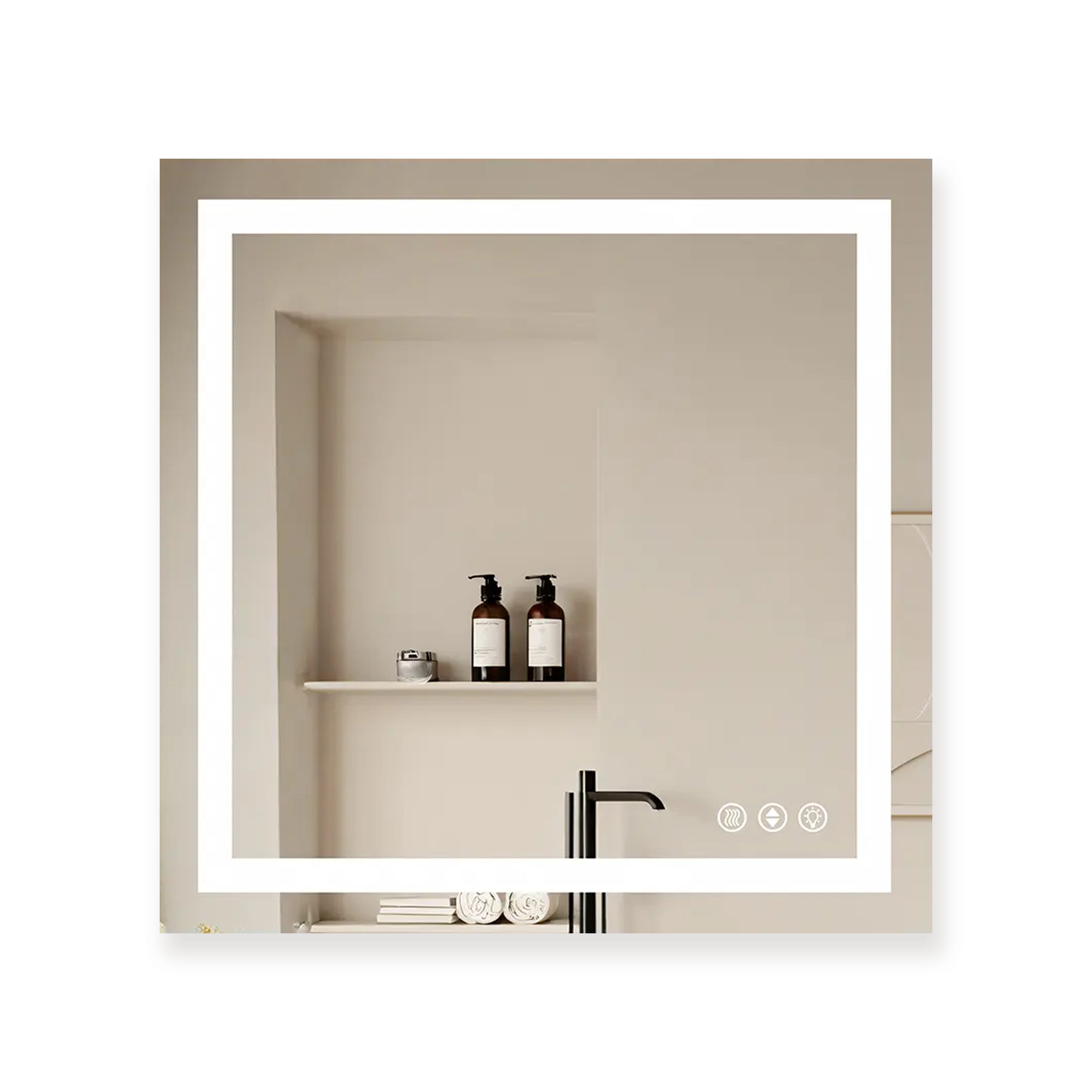When redesigning a bathroom, the mirror is often the centerpiece that brings the whole space together. However, beyond the size and shape, the material of the frame plays a crucial role in defining the overall style, durability, and functionality of your mirror. It may seem like a small detail, but choosing the right material for a framed bathroom mirror can make a significant difference in how your bathroom feels and functions daily. Wood, metal, and resin are the most popular choices, each with unique strengths. By understanding these materials, you can make a choice that not only suits your bathroom’s style but also its practical needs.
Why Frame Material Matters More Than You Think

You might assume the frame is just about aesthetics, but in a bathroom, the material you choose can determine how well your mirror holds up over time. Bathrooms are humid environments, filled with steam from showers and splashes of water from sinks. The frame’s material affects how well it resists moisture, whether it will warp or rust, and how easy it is to maintain.
Imagine walking into your bathroom every day and seeing a warped or rusted mirror—it’s not just an eyesore, but it disrupts the sense of peace and order you want from such a space. The frame isn't just a design choice; it’s a practical consideration. Investing in the right material will help maintain the functionality and aesthetic appeal of your bathroom for years to come.
1. Wood Framed Bathroom Mirrors
Natural Charm and Timeless Elegance

Wood brings an undeniable warmth and texture to any bathroom, making it a popular choice for those looking to create a cozy, welcoming space. Whether it’s a sleek walnut frame or a reclaimed wood design, wood-framed mirrors can enhance traditional, rustic, or even modern bathrooms with the right finish.
There’s something about wood that feels grounding, connecting the bathroom to the natural world. This makes wooden frames an excellent option for those who want a bathroom that feels like a retreat from the stress of daily life. Wood, particularly in lighter shades or with distressed finishes, can evoke a sense of calm that you might associate with spa environments.
Practical Concerns with Wood
However, wood does have its challenges, particularly when it comes to moisture. Natural wood is porous, meaning it can absorb moisture if not properly treated. This can lead to warping, cracking, or discoloration over time. Bathrooms with poor ventilation can exacerbate this problem. If you love the look of wood, it’s important to invest in high-quality, sealed wood that is designed to withstand the moisture-rich environment of a bathroom.
A Thought to Consider:
Think about the longevity of your choice. Wood may require more maintenance, but with the right care, it can age beautifully, developing character over time. For homeowners who are willing to invest in maintenance, wood offers an unparalleled blend of beauty and durability.
2. Metal Framed Bathroom Mirrors
Sleek, Modern, and Resilient
If wood brings warmth, metal delivers sleek sophistication. Metal-framed mirrors, whether brushed nickel, matte black, or chrome, are often associated with modern, industrial, or minimalist design. Metal’s reflective qualities enhance light in a bathroom, making the space feel brighter and more open—a particularly valuable feature in small or dimly lit bathrooms.
From a practical standpoint, metal is hard to beat in terms of durability. Unlike wood, metal doesn’t warp or absorb moisture, making it a prime choice for high-humidity environments. For households with heavy bathroom usage, such as large families or shared bathrooms, metal’s resilience can be a major benefit.
Balancing Style and Comfort

The one criticism of metal-framed mirrors is that they can sometimes feel cold or sterile. This might not be the atmosphere you’re trying to create, especially if your bathroom serves as a place to relax and unwind. To soften the look, consider mixing metal frames with warmer materials, like wood or textiles, elsewhere in the bathroom. For example, pairing a metal-framed mirror with plush towels or warm-colored tiles can strike a perfect balance between modernity and comfort.
A Thought to Consider:
Think about your personal connection to the space. If you want your bathroom to feel more like a spa or retreat, consider how metal might impact that feeling. However, if you're aiming for a modern or industrial look, machining components offer a low-maintenance, high-style option that won't disappoint.
3. Resin Framed Bathroom Mirrors
Affordable, Versatile, and Low Maintenance
Resin is a synthetic material that offers immense versatility, both in design and cost. This material can be molded into virtually any shape or style, allowing homeowners to achieve high-end looks without the price tag. Resin is often designed to mimic other materials—like wood or stone—making it a good choice for those who love the look of natural materials but need something more durable for bathroom conditions.
The affordability of resin-framed mirrors makes them accessible to a wider audience, especially those doing renovations on a budget. But don’t let the lower price point fool you—resin can still offer a durable, water-resistant frame that’s easy to clean and maintain.
The Downside of Imitation

While resin is practical, it lacks the authenticity of wood or metal. For some, the fact that resin often imitates more luxurious materials can detract from the overall look of the bathroom. Additionally, over time, some resin frames can fade or become discolored, particularly if exposed to direct sunlight or harsh cleaning chemicals.
A Thought to Consider:
If budget is a priority and you need something durable and low maintenance, resin is a great choice. However, be mindful of the quality. High-end resin frames can look elegant, but cheaper versions may not hold up as well, particularly if you're aiming for a sophisticated, timeless design.
How to Choose the Right Material for Your Bathroom Mirror
When it comes to selecting the perfect frame material, your decision should be based on more than just style preferences. Consider your bathroom’s environment, how often it’s used, and what kind of atmosphere you want to create.
1. Think About Moisture

For bathrooms that experience a lot of humidity—perhaps those with frequent shower use or less-than-ideal ventilation—metal and resin are the safest bets. Their water-resistant properties mean they’ll hold up without warping, rusting, or requiring extra maintenance. However, if you’ve fallen in love with the warmth and character of wood, don’t let moisture scare you off. With proper treatment and care, wooden frames can withstand moisture, particularly if you invest in high-quality, sealed wood products.
2. Consider Long-Term Maintenance
Wood requires more attention over time, including periodic resealing and careful cleaning to avoid damage. In contrast, metal and resin are both low-maintenance options that only require occasional wiping to stay clean. If you’re someone who prefers a fuss-free bathroom, metal or resin might be the better long-term investment. However, if you don’t mind the occasional upkeep and love the warmth of wood, the extra effort may be worth it.
3. Balance Aesthetic and Practicality
Your mirror frame should reflect the style you want to achieve in your bathroom, but it shouldn’t sacrifice practicality. The line markings on the metal sheet after it is cut by the fiber laser cutting machine will indirectly enhance this appearance, adding to the clean, minimalist look that metal naturally provides. If you want your bathroom to feel like a warm, rustic retreat, a wooden frame will help you achieve that ambiance. And for those who want maximum design flexibility at an affordable price, resin provides a happy medium.
Conclusion
Choosing the right material for your framed bathroom mirror is an important decision that influences both the design and functionality of your bathroom space. Each material—wood, metal, and resin—offers its own unique set of benefits. Wood adds warmth and natural beauty but requires more maintenance, while metal provides sleek durability, ideal for modern spaces. Resin, on the other hand, is versatile and affordable, making it a great option for those looking to balance style and budget.
As you make your decision, consider the atmosphere you want to create in your bathroom, the maintenance level you’re willing to commit to, and the environmental conditions your mirror will need to withstand. By weighing these factors, you’ll be able to choose a framed mirror that not only enhances your bathroom’s design but also serves as a functional, lasting investment.
Whether you prefer the warmth of wood, the modernity of metal, or the versatility of resin, brands like ACE DECOR, Kohler, and other trusted manufacturers offer a wide range of options to help you achieve the perfect balance between style and practicality in your bathroom.

FAQ
-
Which material is best for bathrooms with high humidity?
Metal and resin are ideal for high-humidity environments because of their moisture resistance and durability. -
Is wood a good choice for bathroom mirrors?
Yes, wood can be a beautiful option, but it requires proper sealing and maintenance to withstand the moisture in bathrooms. -
What makes resin a popular option for bathroom mirrors?
Resin is affordable, highly versatile, and resistant to moisture, making it a great choice for budget-conscious homeowners who want durable mirrors. -
How do I maintain a metal-framed mirror?
Metal-framed mirrors are low-maintenance, requiring only occasional cleaning to maintain their appearance and prevent tarnishing. -
Can resin mirrors mimic the look of natural materials?
Yes, resin mirrors can be designed to replicate the appearance of wood, stone, or other natural materials, offering a more affordable alternative.








